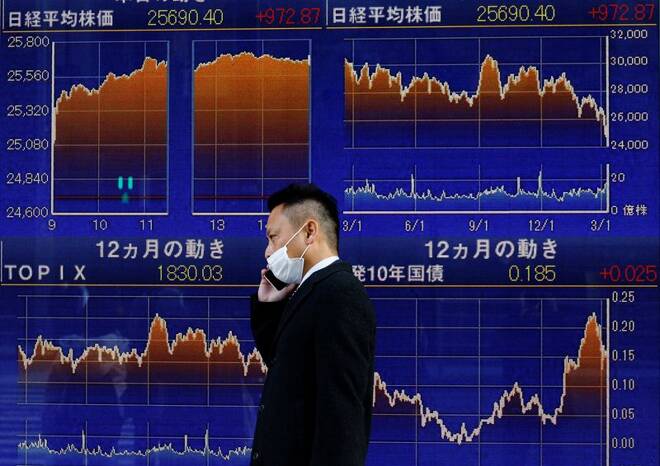Advertisement
Advertisement
Stocks slide, dollar gains on hot U.S. inflation data
By:
By Stella Qiu and Alun John BEIJING/HONG KONG (Reuters) - Asian shares tracked Wall Street lower on Friday, while the dollar held on to its overnight gains, after rate hike guidance from the European Central Bank and upcoming U.S. inflation data unnerved investors.
By Herbert Lash
NEW YORK (Reuters) -Global equity markets slumped and the dollar strengthened on Friday after a bigger-than-expected U.S. inflation spike in May raised concerns the Federal Reserve may tighten policy for too long and cause a sharp slowdown.
The U.S. consumer price index increased 8.6% last month, the largest year-on-year increase since December 1981, the Labor Department said. Economists polled by Reuters had expected CPI to rise 8.3% annually.
Many economists and market participants expected the data to show inflation had peaked, but gasoline prices hit a record high, the cost of food soared and rental prices surged.
“It was pretty hot. This report suggests that underlying inflation pressures remain quite strong,” said Aichi Amemiya, senior U.S. economist at Nomura.
The dollar rose to a near four-week high against a basket of currencies, while U.S. Treasury prices tumbled and short- and intermediate-dated yields hit their highest levels in more than a decade. Two-year yields, which are highly sensitive to rate hikes, spiked to 3.065%, the highest since June 2008.
Stocks on Wall Street and in Europe fell more than 2% as investors feared central bank efforts to control inflation would be so harsh it would slow growth and squeeze corporate earnings.
The pan-European STOXX 600 index fell 2.69% and MSCI’s gauge of global equity markets shed 2.79%.
On Wall Street, the Dow Jones Industrial Average fell 2.73%, the S&P 500 lost 2.91% and the Nasdaq Composite dropped 3.52%. The three indices posted their biggest weekly declines since January, tumbling roughly 5% each.
The S&P 500 is now down more than 18% from its Jan. 3 record closing peak, a drop that again puts it near to confirming a bear market as defined by a 20% drop on a closing-price basis.
The stronger-than-expected CPI data has changed the calculus for what the Fed does in September after “most assuredly” raising rates 50 basis points next week and in July, said Art Hogan, chief market strategist at National Securities.
Analysts at Barclays and Jefferies now expect the Fed to deliver its first 75 basis point increase in 28 years next week.
Fed funds futures traders expect the Fed’s benchmark rate to increase to 3.69% next May, from 0.83% now.
The Fed still has a chance of engineering a softer landing as there’s mounting evidence a slowdown is happening, said Rhys Williams, chief strategist at Spouting Rock Asset Management.
“At least in the goods economy, there are signs that demand is really slowing,” Williams said. “Houses are on the market much longer, auto sales are not so hot and shipping rates have collapsed coming from Asia to here.”
Japan hints at yen intervention
Concerns also mounted about demand and growth in China, the world’s second-largest economy, after Shanghai and Beijing imposed new COVID-19 lockdown restrictions.
The yen rose off 20-year lows after Japanese policymakers made rare comments about its weakness. Japan’s government and central bank said they were concerned by recent sharp falls in the yen in a rare joint statement, the strongest warning to date that Tokyo could intervene to support the currency.
The yen has been plumbing 20-year lows against the dollar and seven-year troughs against the euro on expectations the BOJ will continue to lag other major central banks in exiting its stimulus policy.
The Japanese yen later weakened 0.05% at 134.41 per dollar.
The dollar index rose 0.852%, with the euro down 0.9% to $1.0519.
Overnight in Asia, MSCI’s broadest index of Asia-Pacific shares outside Japan fell 0.9%.
Continued strong buying by foreign investors and cautious hopes of regulatory easing on tech firms lifted China stocks, despite lockdown alerts.
China’s blue-chip CSI300 index was up 1.5%, while Hong Kong shares trimmed earlier losses to end off 0.2%.
Oil prices fell on concerns rising prices will force consumers to cut demand, and as China imposed new COVID-19 lockdown measures.
U.S. crude futures fell 84 cents to settle at $120.67 a barrel, and Brent settled down $1.06 at $122.01.
Gold prices rebounded strongly in volatile trade as focus turned to economic risks of elevated inflation.
U.S. gold futures settled up 1.2% to $1,875.50 an ounce.
(Reporting by Herbert Lash; Additional reporting by Carolyn Cohn in London, Shreyashi Sanyal in Bengaluru; Editing by Chizu Nomiyama, Kirsten Donovan, Alex Richardson and Cynthia Osterman)
About the Author
Reuterscontributor
Reuters, the news and media division of Thomson Reuters, is the world’s largest international multimedia news provider reaching more than one billion people every day. Reuters provides trusted business, financial, national, and international news to professionals via Thomson Reuters desktops, the world's media organizations, and directly to consumers at Reuters.com and via Reuters TV. Learn more about Thomson Reuters products:
Did you find this article useful?
Latest news and analysis
Advertisement
